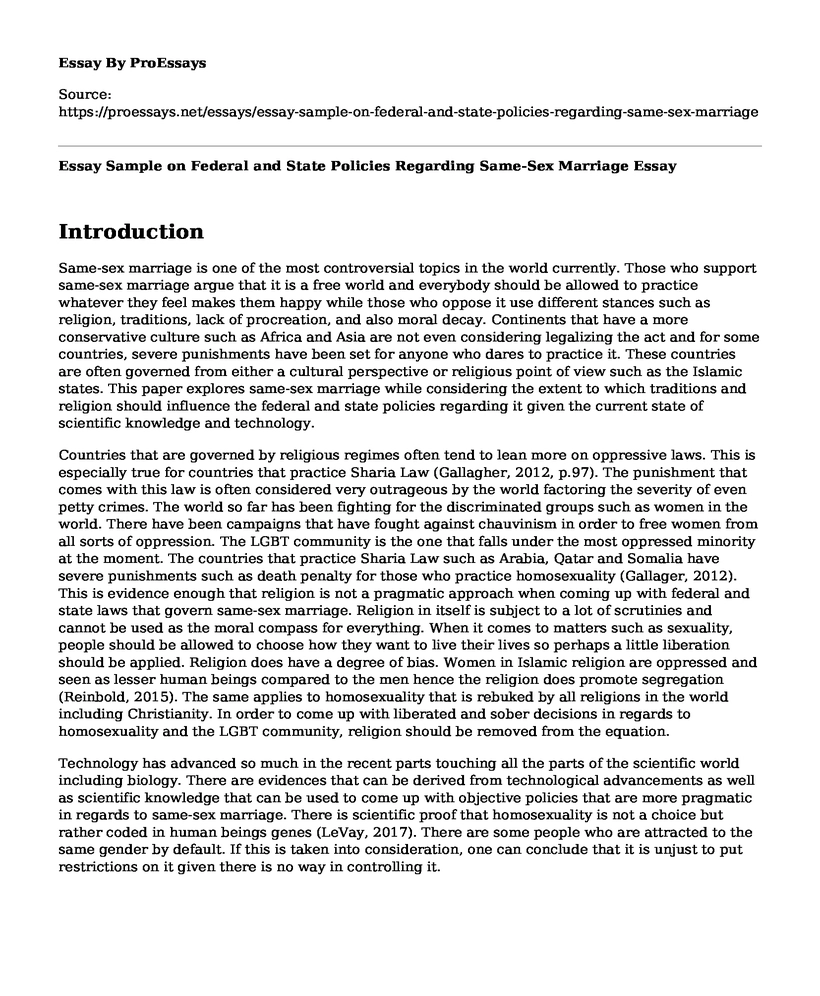Introduction
Same-sex marriage is one of the most controversial topics in the world currently. Those who support same-sex marriage argue that it is a free world and everybody should be allowed to practice whatever they feel makes them happy while those who oppose it use different stances such as religion, traditions, lack of procreation, and also moral decay. Continents that have a more conservative culture such as Africa and Asia are not even considering legalizing the act and for some countries, severe punishments have been set for anyone who dares to practice it. These countries are often governed from either a cultural perspective or religious point of view such as the Islamic states. This paper explores same-sex marriage while considering the extent to which traditions and religion should influence the federal and state policies regarding it given the current state of scientific knowledge and technology.
Countries that are governed by religious regimes often tend to lean more on oppressive laws. This is especially true for countries that practice Sharia Law (Gallagher, 2012, p.97). The punishment that comes with this law is often considered very outrageous by the world factoring the severity of even petty crimes. The world so far has been fighting for the discriminated groups such as women in the world. There have been campaigns that have fought against chauvinism in order to free women from all sorts of oppression. The LGBT community is the one that falls under the most oppressed minority at the moment. The countries that practice Sharia Law such as Arabia, Qatar and Somalia have severe punishments such as death penalty for those who practice homosexuality (Gallager, 2012). This is evidence enough that religion is not a pragmatic approach when coming up with federal and state laws that govern same-sex marriage. Religion in itself is subject to a lot of scrutinies and cannot be used as the moral compass for everything. When it comes to matters such as sexuality, people should be allowed to choose how they want to live their lives so perhaps a little liberation should be applied. Religion does have a degree of bias. Women in Islamic religion are oppressed and seen as lesser human beings compared to the men hence the religion does promote segregation (Reinbold, 2015). The same applies to homosexuality that is rebuked by all religions in the world including Christianity. In order to come up with liberated and sober decisions in regards to homosexuality and the LGBT community, religion should be removed from the equation.
Technology has advanced so much in the recent parts touching all the parts of the scientific world including biology. There are evidences that can be derived from technological advancements as well as scientific knowledge that can be used to come up with objective policies that are more pragmatic in regards to same-sex marriage. There is scientific proof that homosexuality is not a choice but rather coded in human beings genes (LeVay, 2017). There are some people who are attracted to the same gender by default. If this is taken into consideration, one can conclude that it is unjust to put restrictions on it given there is no way in controlling it.
Conclusion
In as much as the world cannot shun away religion and tradition of people since it is a key determinant in how people are, there should be limitations in when and where it is applied. A limitation on policies such as sexuality is necessary given that it is prone to being bias and does not have room for liberated perspectives. Given that science deals with facts more than perception, it is logical to use it when coming up with life-changing policies.
References
Gallagher, M. (2012). The Case Against Same-Sex Marriage. Debating Same-Sex Marriage, 91-178. Doi:10.1093/acprof:osobl/9780199756322.003.0003
LeVay, S. (2017). Gay, straight, and the reason why: The science of sexual orientation. New York, NY: Oxford University Press.
Reinbold, J. (2015). Traditional Marriage on Trial: The Supreme Court, Same-Sex Marriage, and the Fate of Secular Argumentation. Journal Of Church And State, csv100. http://dx.doi.org/10.1093/jcs/csv100
Cite this page
Essay Sample on Federal and State Policies Regarding Same-Sex Marriage. (2022, Apr 29). Retrieved from https://proessays.net/essays/essay-sample-on-federal-and-state-policies-regarding-same-sex-marriage
If you are the original author of this essay and no longer wish to have it published on the ProEssays website, please click below to request its removal:
- Essay Example: Gender, Race, and Class Dissimilarities in Europe in the 19th century
- Race and Its Representation Through Media
- Race, Religion and Cultural Competency Paper Example
- Jail Offender Issues Reentry to Society - Essay Sample
- The Influence of Parental Style on Adolescent Behavior Essay Example
- Essay on Prejudice: An Unjustified & Unenthusiastic Approach Towards Groups
- The Pilgrim's Journey: A Political & Social Analysis of John Bunyan's Classic - Essay Sample







